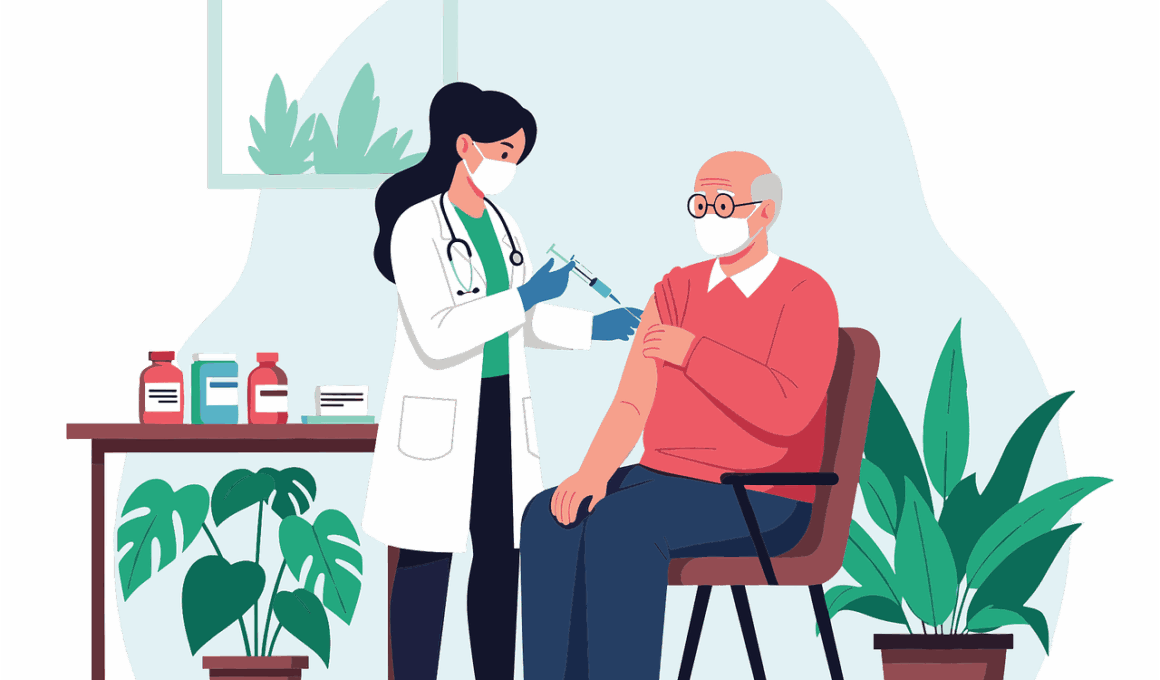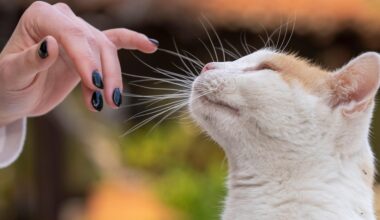Preventative Care: Combining Immunizations with Parasite Control in Senior Cats
As our feline friends age, they become more susceptible to various health issues. Senior cats, typically classified as those over the age of seven, often experience a decline in their overall health that requires greater attention. Effective preventative care becomes essential to maintain their quality of life. A crucial aspect of this care is ensuring that senior cats receive timely immunizations, which serve to protect them from several infectious diseases. In addition, parasite control should not be overlooked, as older cats may have weaker immune systems, making them more vulnerable to infestations. Integrating immunizations with regular parasite treatments is vital for optimal health management. Owners should consult their veterinarians regularly to create a tailored health plan that includes both vaccinations and parasite prevention measures. This approach not only safeguards the cat from diseases but also alleviates stress for both the pet and owner in the long run. Regular visits can help identify any potential health issues early, enhancing the effectiveness of treatment and improving the overall well-being of senior cats.
Understanding the necessary immunizations for senior cats is vital. While kittens typically receive a series of vaccinations, many owners may overlook the need for booster shots in their older pets. Senior cats should receive core vaccinations, such as FVRCP (Feline Viral Rhinotracheitis, Calicivirus, and Panleukopenia) and rabies, every one to three years, depending on local regulations and veterinarian recommendations. These vaccinations can prevent serious illnesses that could affect a senior cat’s already compromised health. Furthermore, non-core vaccinations may be recommended based on the cat’s lifestyle and risk of exposure. For example, cats that go outdoors or live with other pets may benefit from feline leukemia (FeLV) vaccination. Discussing schedules for these immunizations with a veterinarian ensures that the senior cat receives optimal protection throughout its lifetime. Additionally, pet owners should keep detailed records of all immunizations, making it easier to track vaccinations over time. Consistent monitoring of a senior cat’s health combined with vaccinations can make a significant difference in prolonging a cat’s lifespan and quality of life, providing them with the healthiest years possible.
Importance of Parasite Control for Senior Cats
Parasite control is essential for the health of senior cats. These parasites, including fleas, ticks, and worms, can pose serious health threats to older felines. As cats age, their immune systems weaken, making them more vulnerable to these infestations. Parasitic diseases can lead to various health complications if left untreated, including anemia, gastrointestinal issues, and skin infections. Regular use of preventatives is advisable to safeguard senior cats from these harmful agents. Flea and tick treatments should be administered monthly or as directed by a veterinarian, ensuring that cats remain comfortable and healthy. Moreover, regular deworming is necessary, particularly if the cat shows signs of potential infestations. It’s essential to monitor senior pets closely for unusual behaviors that may indicate a parasite issues. Symptoms like decreased appetite, lethargy, or visible changes in coat condition may suggest the presence of parasites requiring medical attention. Implementing a routine check for parasites, along with scheduled immunizations, supports holistic health management by addressing common threats that older cats face, ultimately enhancing their well-being.
Nutrition plays a pivotal role in the overall health and effectiveness of immunizations in senior cats. A balanced diet, rich in essential nutrients, can help strengthen their immune systems. An ideal diet should contain high-quality proteins, low carbohydrates, and necessary vitamins and minerals that cater specifically to the needs of older felines. Senior cats may benefit from specially formulated feeds designed to support aging health, ensuring they receive adequate hydration and nutrition. Coordinating dietary needs with vaccinations and parasite control can help achieve an overall preventive care strategy. Frequent small meals, for example, can assist with digestion, ensuring optimal nutrient absorption. Owners should also monitor their pets for any issues, such as weight gain or loss, as changes in appetite or weight can impact overall health. Consulting with a veterinarian can provide guidance in selecting the most appropriate foods. By focusing on a well-rounded diet in tandem with vaccinations and parasite prevention, owners can effectively enhance their senior cat’s immune response, protecting them against both infectious diseases and infestations that may arise.
Regular Veterinary Check-ups
One of the essential aspects of senior cat care is the importance of regular veterinary check-ups. These appointments allow veterinarians to assess the overall health of the cat and determine the need for booster shots or additional vaccinations. During these consultations, any changes in behavior or physical condition can be addressed. It’s crucial to discuss specific concerns regarding immunizations and parasite control, as this knowledge aids in making informed decisions for your cat’s health. By developing a strong relationship with a veterinarian, owners can tailor the health plans to meet individual needs, particularly as they change over time. Routine examinations enable the early detection of diseases, which is particularly important for senior cats prone to conditions like kidney disease or hyperthyroidism. Furthermore, these visits offer the opportunity for weight management discussions, nutritional advice, and checks for parasites. Regular professional evaluations combined with at-home care help to maintain a high quality of life for senior cats. Keeping a proactive approach ensures that any underlying health issues can be swiftly managed, significantly contributing to a long and healthy life.
Implementing preventative care for senior cats requires commitment and dedication from owners. The effects of proper immunizations and parasite control can dramatically impact a feline’s well-being and longevity. Understanding their individual needs is paramount to providing customized care that fosters resilience against health threats. Budgeting for veterinary visits, medications, and high-quality foods is essential for sustaining this commitment to health. Moreover, staying informed about the latest veterinary practices can provide better insights into how to care effectively for senior pets. As cats age, being receptive to signs of decline encourages timely interventions, which can ultimately make all the difference. Owners should also consider joining a community of fellow cat owners or online forums for shared experiences and tips on senior cat care. Engaging with others fosters support and creates a wealth of knowledge to draw from when concerns arise. Isolating oneself can lead to feelings of discouragement or helplessness in times of worry. Ultimately, prioritizing both vaccinations and parasite management alongside a community can enhance the experience of caring for a senior cat, ensuring they receive abundant love and attention.
Conclusion: The Path to a Healthy Senior Cat
In conclusion, combining immunizations with parasite control forms the foundation for a healthy lifestyle in senior cats. By understanding the unique health challenges that aging cats face, owners can implement comprehensive care strategies tailored to their feline companions. Regular consultations with veterinarians ensure that vaccinations remain updated, while vigilant parasite management helps to keep infestations at bay. Adopting a proactive approach to senior cat care fosters a preventative mindset that equips owners to address health concerns effectively. Enriching a senior cat’s life with proper nutrition, social interactions, and mental stimulation further promotes their physical and emotional well-being. The journey of caring for a senior cat can be incredibly rewarding as they provide companionship and affection in their golden years. Owners should celebrate each milestone while ensuring their pets have access to the medical care required to maintain a good quality of life. By combining these elements, we pave the way for our cherished cats to enjoy their later years comfortably and happily, building lasting memories together that enrich both human and feline lives.
As our feline friends age, they become more susceptible to various health issues. Senior cats, typically classified as those over the age of seven, often experience a decline in their overall health that requires greater attention. Effective preventative care becomes essential to maintain their quality of life. A crucial aspect of this care is ensuring that senior cats receive timely immunizations, which serve to protect them from several infectious diseases. In addition, parasite control should not be overlooked, as older cats may have weaker immune systems, making them more vulnerable to infestations. Integrating immunizations with regular parasite treatments is vital for optimal health management. Owners should consult their veterinarians regularly to create a tailored health plan that includes both vaccinations and parasite prevention measures. This approach not only safeguards the cat from diseases but also alleviates stress for both the pet and owner in the long run. Regular visits can help identify any potential health issues early, enhancing the effectiveness of treatment and improving the overall well-being of senior cats.


